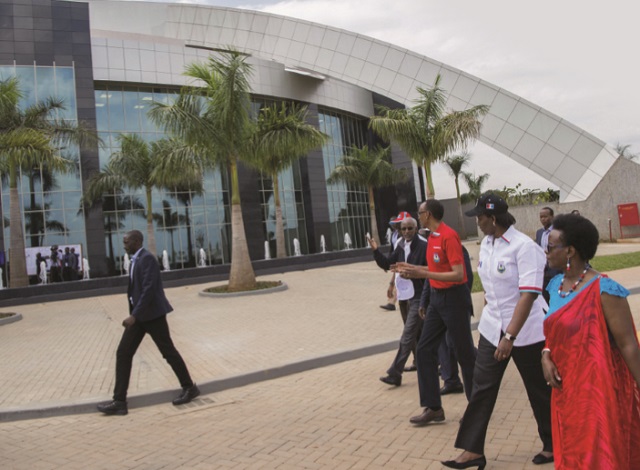
ANALYSIS: Museveni criticised, Kagame unveils fancy party headquarters
Kampala, Uganda | HAGGAI MATSIKO | On June 17, President Paul Kagame unveiled the complex of buildings comprising the headquarters of his party, the Rwandan Patriotic Front (RPF) in Nyagahinga Cell in the Rosoro sector of Gasabo District.
The centerpiece of the US$10 million complex is a dome shaped glass-shuttered two story structure that houses a political school, a 1500 seat conference hall, accommodation facilities, and a restaurant. The complex is set in beautiful gardens and paved walkways and open spaces adorned with water fountains.
One unintended consequence of Kagame’s unveiling of the RPF headquarters has been an avalanche of criticism again his friend, President Yoweri Museveni for failing to construct headquarters for his National Resistance Movement (NRM) party which has been in power for 31 years.
The NRM party Secretary General, Kasule Lumumba, who led a high-powered delegation to the event where Kagame unveiled the RPF headquarters has fielded a barrage of questions on the issue. At the inauguration, Lumumba acknowledged RPF had challenged the NRM.
However, the incident has led to a broader discussion of the management of political party finances in Uganda and, specifically, why the ruling NRM party exists in a hand-to-mouth manner.
On the day Lumumba watched President Kagame cut the ribbon on the RPF headquarters in Kigali, Lumumba and President Museveni’s NRM was in danger of being sued over failure to pay rent to the owner of the building housing its headquarters on Plot 10 Kyadondo Road.
It is a tiny colonial style building with algae-infested old brick-red clay tiles and old walls painted in yellow – the party colours. If it were not the headquarters of the ruling party, it possibly would already have been demolished to pave for a more modern building. Inside it, however, are a collection of ever angry and complaining NRM party workers. They appear to be always quarreling over unpaid or delayed salaries.
The chaos at the Kyadondo NRM headquarters is in sharp contrast to the example set by one of Uganda’s oldest parties; the opposition Uganda Peoples Congress (UPC) which, as early as 1980, completed a 16-story tower headquarters that dominates the Kampala skyline on the city’s main street. As the comparisons continue, questions are being asked about why President Museveni appears to prefer to run his party without a headquarters and out of his pocket.
Events surrounding Lumumba’s appointment as SG are often cited as an example of President Museveni’s out-of-pocket management style. Until her appointment by Museveni on December 23, 2014, Lumumba had been the Government Chief Whip; which is a powerful cabinet position.
At a function to celebrate her appointment, Museveni noted that she had won the appointment because of her stellar performance while serving as the ruling party Chief Whip.
She was appointed together with a full-fledged new team including Todwong, her deputy, Tanga Odoi, the EC chairman, John Kigyagi, his deputy, Namayanja, the treasurer and Kenneth Omona, the deputy treasurer, among others.
Although the party was in rent arrears, Museveni said he was offering them hefty salaries to motivate them. He also bought them pricey SUVs like the ones driven by cabinet ministers.
As a result, the costs of running the party piled up. Meanwhile, the sources of revenue have remained the same. The party relies mostly on collections from its members of parliament and election fees from its candidates.
“The real problem here is that our party chairman is not interested in building strong institutions that he would then have to account to,” said an insider in the party who spoke to The Independent on condition of anonymity, “Throughout the party’s history, whenever issues like these are brought to his attention, the chairman has always said that they will be dealt with at an appropriate. That they are not urgent. But these reflect badly on the party.”
The official said that this is why the party has failed to actualise the plans to establish the Movement House, which has always been pitched as the party headquarters.
President Museveni first officially revealed the grand plan for the Movement House at a July 27, 2001 meeting at State House Nakasero. According to the plan, the Movement House was to be a 27 storied structure—symbolising the 27 guns used to launch the war that resulted into his capture of power in 1986. According to that plan, construction was meant to start that year. It was to be located behind Crested Towers in Kampala, across the road from the former Shimon Primary School and Teachers College.
Museveni also laid out a plan of how the money needed to build the Movement House would be raised. He told members that he had a target of Shs 300,000 from each capable member and estimated that just 100,000 such members would raise Shs30 billion, which would be a good start.
To show seriousness, the president even appointed former Prime Minister and retired legislator Kintu Musoke to head the fundraising and building committee.
Sixteen years later, nothing has been built and the plot remains overgrown with bush. Kintu Musoke could not comment on the matter when contacted by The Independent. He said he was in hospital for treatment.
“You are lucky you are talking to me,” Musoke told The Independent, “I am admitted. Let us talk when I am better.”
 The Independent Uganda: You get the Truth we Pay the Price
The Independent Uganda: You get the Truth we Pay the Price





